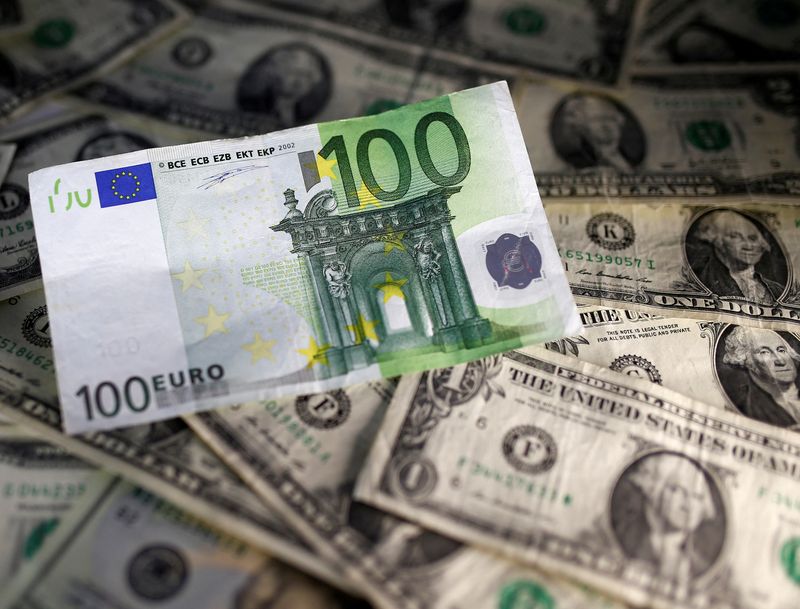LONDON (Reuters) -The euro has fallen to one-year lows, reviving talk the currency could hit the $1 mark. Donald Trump's U.S. election win raises the prospect of a hike in tariffs that could deal a fresh blow to the euro zone economy.
At around $1.05, the euro has slumped 6% from more than one-year highs in September when a weakening economic outlook stopped it in its tracks.
Euro/dollar is the world's most actively traded currency pair.
Here's a look at what's driving the move in the euro and what could be next for the currency.
1. Could the euro hit $1?
It's possible. Parity is just 5% away and the euro has traded below that level before - once in the early 2000s and again for a few months in 2022, when U.S. interest rates were rising faster than euro zone ones as Europe grappled with the energy price surge that followed the war in Ukraine.
For traders, the $1 mark is a key psychological level. So a fall below here could exacerbate negative euro sentiment, leading to a further depreciation.
Big banks including JPMorgan and Deutsche Bank (ETR:DBKGn) reckon a drop to parity could happen, depending on the extent of tariffs. Tax cuts could also fuel U.S. inflation and limit Federal Reserve rate cuts, making the dollar potentially more attractive than the euro.
2. What does it mean for businesses and households?
A weak currency typically raises the cost of imports. That can lead to prices of food, energy and raw materials rising, aggravating inflation.
Since hitting double digits two years ago, inflation has fallen quickly so the hit to prices from currency weakness shouldn't be a big worry for now. Most economists see inflation back at its 2% target next year after some volatility at the end of 2024.
Conversely, a fall in the euro makes exports cheaper - good news for Europe's automakers, industrials and luxury retailers, for example, and for individuals or investors with overseas incomes.
It's especially positive for Germany. Long-considered Europe's export engine, the German economy has suffered from a number of headwinds including a weak Chinese economy.
3. Is the euro being singled out?
Not necessarily. Many currencies of major U.S. trading partners have been hit hard in the past six weeks by tariff worries.
The euro has lost over 4.5%, while the Mexican peso has lost 6% and the Korean won has fallen 5.4%. The euro actually rallied 6% over the course of Trump's last term, but fell by nearly 6% in the six weeks following the 2016 result, before recovering.
And look at Japan's yen. It's down almost 10% this year against the dollar; the euro has fallen less than half of that.
4. Is it really that bad?
Not everyone has a bearish long-term view of the euro. Many banks see parity as possible, but not necessarily probable.
Faster interest rate cuts from the European Central Bank (ECB) than in the United States would be negative for the euro, but on the positive side that easing could also support the currency longer term by boosting the economic growth outlook.
The euro zone economy grew 0.4% in the third quarter from the previous three months, faster than forecast, positive for the euro. The collapse of Germany's government that potentially paves the way for growth-boosting spending under the next one could also be supportive.
"Everyone is gloomy on Europe and we understand the gloominess but we could have some positive surprises," said Edmond de Rothschild CIO Benjamin Melman, adding he does not see a significant euro downturn from here.
5. What does it mean for the ECB?
The ECB is in a better position than the last time the euro weakened sharply - that was in 2022 and inflation was surging so the euro's drop below $1 added pressure on the central bank to hike rates.
Fast forward to today and inflation is trending lower. There are other reasons why a fall to $1 would not be a huge worry for the ECB.

The ECB pays more attention to how the euro performs against a basket of the currencies of the euro area's main trading partners. Viewed this way, it's not looking so weak. The trade-weighted euro is down less than 1% in the past week and well above levels seen in 2022.
Economists also note that the pass-through from currency moves to inflation is relatively small, so euro weakness shouldn't stall rate cuts for now.